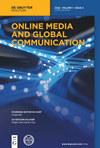起义期间的社交媒体行为:中国(香港)、伊朗、伊拉克和黎巴嫩抗议活动中的选择性分享和回避
引用次数: 0
摘要
摘要目的本研究调查了在中国(香港)、伊拉克、伊朗和黎巴嫩的抗议活动中个人使用社交媒体的情况。方法对这四个国家的调查评估了人们对抗议活动的态度与他们在社交媒体上的选择偏见之间的关系,这些偏见表现为选择性分享和选择性回避。调查结果无论每个国家的政治和媒体体系不同,社交媒体的使用基本相似。总体而言,我们的研究结果表明,人们对抗议活动的态度强度与他们的选择性分享行为有关;那些在支持抗议活动中得分较高的人比那些在反对抗议活动中评分较高的人更有可能分享支持抗议活动的新闻,反之亦然。至于选择性回避,社交媒体抗议新闻的使用成为最有力的预测因素。在社交媒体上关注和分享抗议新闻的人越多,他们就越有可能通过隐藏或删除评论、解除好友关系或取消关注、屏蔽或举报发布他们不同意的评论来进行选择性回避。对于选择性分享,我们的发现与现有研究一致,现有研究发现,对某些问题态度强烈的人更有可能在社交媒体上表达自己的观点。此外,对于选择性回避,我们的研究支持了文献,该文献表明,个人通过选择性回避来清理环境中态度不一致的信息,尤其是在社交媒体上,在抗议和危机期间尤其如此。价值选择偏见将个人置于隐蔽的群体中,并导致政治分裂和两极分化。研究集中在网上选择性暴露和线下选择性回避上,但网上选择性回避和分享很少被研究。我们的研究有助于在多个国家的两极分化时期对在线选择性分享和选择性回避进行新的研究。本文章由计算机程序翻译,如有差异,请以英文原文为准。
Social media behavior during uprisings: selective sharing and avoidance in the China (Hong Kong), Iran, Iraq, and Lebanon protests
Abstract Purpose This study examines the use of social media by individuals during protests in China (Hong Kong), Iraq, Iran, and Lebanon. Method Surveys in the four countries assess the relationship between people’s attitudes toward the protests and their selection bias on social media, manifested through selective sharing and selective avoidance. Findings Regardless of the different political and media systems in each country, social media usage was largely similar. Overall, our findings established that people’s attitude strength toward the protests was associated with their selective sharing behavior; those who scored high on supporting the protests were more likely than those who scored high on opposing the protests to share news that supports the protests, and vice versa. As for selective avoidance, social media protest news use emerged as the strongest predictor. The more individuals followed and shared protest news on social media, the more likely they were to engage in selective avoidance by hiding or deleting comments, unfriending or unfollowing people, and blocking or reporting people for posting comments with which they disagreed. Implications For selective sharing, our findings are consistent with extant research that found individuals with strong attitudes toward certain issues are more likely to express their opinions on social media. Also, for selective avoidance, our study supports the literature, which shows individuals practice selective avoidance to clean up their environment from attitude-inconsistent information, especially on social media, and exceedingly so during protests and crises. Value Selection bias places individuals into secluded groups and contributes to political divisions and polarization. Research has focused on online selective exposure and on offline selective avoidance, but online selective avoidance and sharing have rarely been studied. Our study contributes to emerging research on selective sharing and selective avoidance online during a period of polarization in multiple countries.
求助全文
通过发布文献求助,成功后即可免费获取论文全文。
去求助
来源期刊

Online Media and Global Communication
Communication, Media Studies, Internet Studies, International Studies, International Relations-
自引率
0.00%
发文量
0
期刊介绍:
Online Media and Global Communication (OMGC) is a new venue for high quality articles on theories and methods about the role of online media in global communication. This journal is sponsored by the Center for Global Public Opinion Research of China and School of Journalism and Communication, Shanghai International Studies University, China. It is published solely online in English. The journal aims to serve as an academic bridge in the research of online media and global communication between the dominating English-speaking world and the non-English speaking world that has remained mostly invisible due to language barriers. Through its structured abstracts for all research articles and uniform keyword system in the United Nations’ official six languages plus Japanese and German (Arabic, Chinese, English, French, Russian, Spanish, Japanese, and German), the journal provides a highly accessible platform to users worldwide. Its unique dual track single-blind and double-blind review system facilitates manuscript reviews with different levels of author identities. OMGC publishes review essays on the state-of-the-art in online media and global communication research in different countries and regions, original research papers on topics related online media and global communication and translated articles from non-English speaking Global South. It strives to be a leading platform for scientific exchange in online media and global communication.
For events and more, consider following us on Twitter at https://twitter.com/OMGCJOURNAL.
Topics
OMGC publishes high quality, innovative and original research on global communication especially in the use of global online media platforms such as Facebook, TikTok, YouTube, Twitter, Instagram, WhatsApp, Weibo, WeChat, Wikipedia, web sites, blogs, etc. This journal will address the contemporary concerns about the effects and operations of global digital media platforms on international relations, international public opinion, fake news and propaganda dissemination, diaspora communication, consumer behavior as well as the balance of voices in the world. Comparative research across countries are particularly welcome. Empirical research is preferred over conceptual papers.
Article Formats
In addition to the standard research article format, the Journal includes the following formats:
● One translation paper selected from Non-English Journals that with high quality as “Gems from the Global South” per issue
● One review essay on current state of research in online media and global communication in a country or region
 求助内容:
求助内容: 应助结果提醒方式:
应助结果提醒方式:


